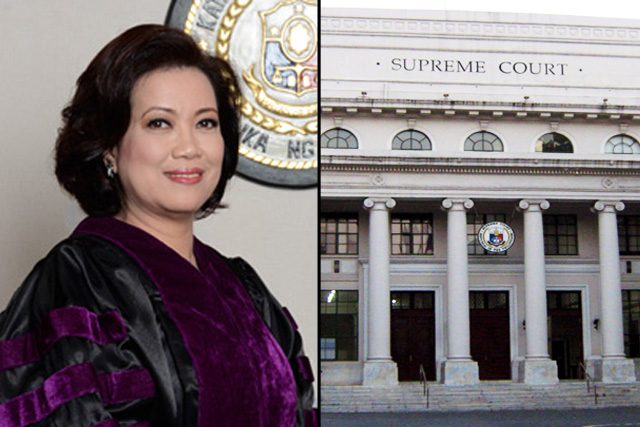Atty. Mel Sta. Maria is the Dean of the Far Eastern University Institute of Law. He also teaches at the Ateneo de Manila School of Law and the Pamantasan ng Lungsod ng Maynila College of Law.
For presidential spokesman Harry Roque to suggest that Chief Justice Maria Lourdes Sereno resign “ to spare the institution from any further damage” is ridiculous.
The rate the Supreme Court is churning out decisions that are highly controversial and/or, worse, perceived as subservient to the wishes of Malacañan, is more reason why the Chief Justice should not resign, to preserve what is left of the good reputation of not only the Supreme Court but the whole government and our democratic system.
For example, the high court ruling allowing the late dictator Ferdinand Marcos — who, together with his cohorts, stole billions of pesos from the Philippine treasury and whose regime resulted in thousands of death and/or disappearances of Filipinos — to be buried at the Libingan ng mga Bayani was so preposterous. The Chief Justice strongly dissented in that case saying that the burial “would be to disregard historical truths and legal principles that persist after death … It would be to degrade the State’s duty to recognize the pain of countless victims of Marcos and Martial law.”
The decision upholding President Rodrigo Duterte’s placing all of Mindanao under Martial Law even though there was no actual rebellion or invasion in many peaceful places is considered by many critics as virtually planting the legal foundation for authoritarianism. The Chief Justice dissented against the almost absolute grant of power to the executive by the majority of the Supreme Court on the imposition of Martial Law, strongly stating that, according to the text and spirit of the Constitution, “ the President, in the exercise of his commander-in-chief-powers, does not have unbridled discretion as to when, where and how martial law is to be declared.”
The acquittal of Gloria Macapagal Arroyo in the plunder case against her was, to many, so premature it prompted the Chief Justice to dissent, stating that the Sandiganbayan resolution to proceed with the trial “cannot be overridden willy-nilly by this Court.”
When the majority of the Supreme Court granted bail to Senator Juan Ponce Enrile, it was so astonishing as it was not strongly premised on anything textually allowed by the Constitution. Again, the Chief Justice openly declared that her position was “an unqualified concurrence with the dissent” of Justice Marvic Leonen, who disagreed with the majority because, in so doing, they concede that there are “those among us who are powerful and networked enough to enjoy privileges not shared by all.”
The absolute pardon granted former President Joseph Estrada was disappointing as it smacks of impunity. The Chief Justice joined the dissent of Justice Leonen who stated that “impunity, in any form, should be abhorred especially when it gives advantage to the privileged and the powerful.”
There can be no dispute that Chief Justice Sereno, together with a small minority in the Supreme Court, provides the rational voice of decency, rationality, historicity, and intelligence in the tribunal. And even if her position did not prevail in the above-mentioned cases, this is so not for poor arguments but simply because there were more votes obtained by the opposite side.
And from the institutional perspective, Chief Justice Maria Lourdes Sereno is the only head of a branch of government not at the beck and call of President Duterte. Speaker Pantaleon Alvarez is an avid follower of the President while Senate President Koko Pimentel is a party-mate. Not only is this the demand of Chief Justice Sereno’s position, in order to preserve whatever perception of independence the Supreme Court still has today, but, more paramount, such attitude is required of the public so they can have the confidence that there is someone authoritative enough and ready to relay to them, if warranted, why the President, the Senate and House of Representatives are, in certain important cases, wrong. That is an imperative in a robust democracy.
Ironically, to maintain Chief Justice Sereno in her position in the Supreme Court will do President Duterte more good than harm. For one, it will show the confidence of his administration in the workings of our institutions despite contrary views espoused by some of its members, especially the Chief Justice of the Supreme Court. That is an indicator of stability. not insecurity.
Second, it will prove that conflicting positions among the three branches of government, or some members of it, are not generated by personalities but by substantial issues better resolved not by ousting people as bullies — accustomed to have their way by brute force — are wont to do, but by the strength of persuasion necessary in a democratic system. That is critical but positive engagement.
And lastly, leaving Chief Justice Maria Lourdes Sereno to perform her official functions, thus not giving any occasion for President Duterte to appoint a new Chief Justice of his choice, will diminish the perception that autocracy led by the executive and with the connivance of the other two other great branches of government — the legislature and the judiciary — is President Duterte’s ultimate objective. That is democratic.
It is not hard to see therefore that nothing can be more inane and nonsensical than insisting that Chief Justice Maria Lourdes Sereno desist from performing her task mandated by the Constitution. She poses no grave danger to the nation, does not subvert our democratic institutions, and is not a menace to the third great branch of government — the judiciary.
The country needs her in these trying times.










